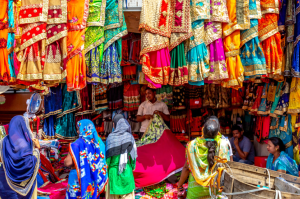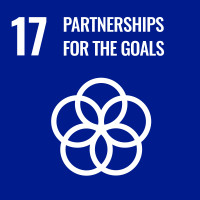Who We Are
April 25, 2022
Ria Jacob

SDG 17: Partnerships for the Goals
Culture is a beautiful idea that can be so unique to someone but also shared by so many. If you search up the definition of culture on Google you will see it defined as, “the customs, arts, social institutions, and achievements of a particular nation, people, or other social group” (Oxford Languages and Google - English).
Through the culture sharing presentations we exchanged in the beginning of the Fall 2021 semester, I noticed that culture can be defined as so much more. These presentations were a project where each Global Scholar was tasked with presenting what culture means to them. What I loved the most about these presentations was the fact that it was an amazing icebreaker for a new group of students, but it was also presented as a concept so broad that everyone put their own twist on it. Some students took the project more literally, like me, and presented about the country their families are from. Others described the state they come from, their favorite book, showed artwork describing their life journey thus far, and much more. I truly believe what made these presentations so meaningful is that we had no one true definition of culture, and we were each allowed to experiment with the idea and what it meant to us.
Personally, I did my presentation on Indian culture because I am very proud of my ethnicity, and I feel as though many do not know much about my culture other than mainstream stereotypes seen in the media. I defined culture in my presentation as the people, food, traditions, language, dance, religion, etc. that people can share in a region. In my presentation, I mentioned how I feel the most connected with my culture by my travels to India, participating in Classical Indian Dance, or Bharatanatyam, and through my Indian Orthodox Church I attend.
Specifically, I feel most connected to my culture when I get to experience parts of it firsthand and truly embrace it in the moment. By getting to travel and visit my family back in India, it allows me to connect to a side of me that I usually don’t get to experience here in the United States. I think many individuals who are considered a minority in America have sometimes felt out of place in certain situations. However, visiting the country where you or your family are from can really allow one to tap into that culture they do not get to witness every day and appreciate it for what it really is. I feel so lucky and fortunate enough to have such a distinct culture that has been passed down for generations because I believe it makes me more secure in my own cultural identity and helps shape my global identity.
After watching everyone’s presentations, I would now expand the definition of culture even more because I have now learned the various ways people view their own culture. It was so fascinating to see my other classmates describe their cultures as their passions in life, through an artistic medium, or where they come from - even a more localized perspective rather than national. I also enjoyed how creative we all got with sharing our individual cultures. Some of us used PowerPoints, others shared videos and pictures, and some brought in physical objects or art pieces to describe their culture. I feel as though I got to know so much about my fellow Global Scholars and about their backgrounds through these short presentations.
I think the best aspect of the culture sharing project was to witness how accepting, tolerant, and even excited everyone was to learn about a culture different from their own. I can tell from the questions that were being asked after each presentation that all of us truly wanted to get to know the presenter and their culture more. I think this curiosity to learn more, specifically about different parts of the world, is what makes us Global Scholars the way we are and reflects the importance of embracing experiential education.
Ria Jacob
2021 Cohort
Adelphi University. “Colorful Saris Hang from the Ceiling and Walls of a Market Stall While Customers Shop.” Adelphi University New York, Adelphi University, 5 Mar. 2022.
Oxford languages and google - english. Oxford Languages. (n.d.). Retrieved April 24, 2022.
